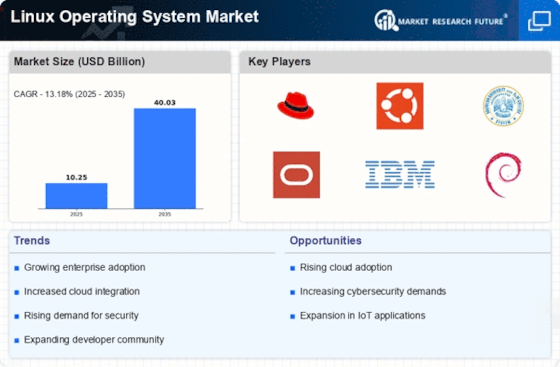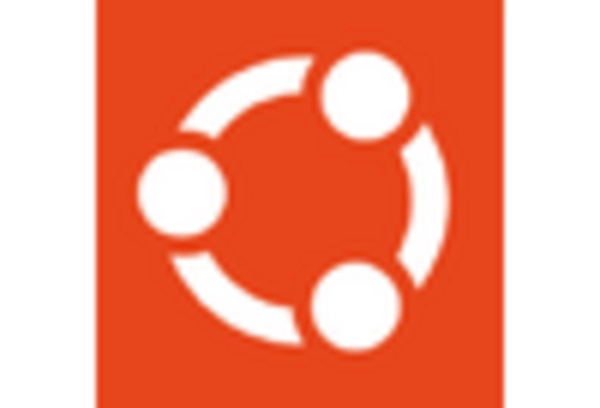Direct Sales
Online Sales
Retail Sales
On-Premises
Cloud-Based
Individual Users
Small and Medium Enterprises
Large Enterprises
Government
Server Operating System
Desktop Operating System
Embedded Operating System
North America
Europe
South America
Asia Pacific
Middle East and Africa
North America Outlook (USD Billion, 2019-2032)
North America Linux Operating System Market by Distribution Channel Type
Direct Sales
Online Sales
Retail Sales
North America Linux Operating System Market by Deployment Type
On-Premises
Cloud-Based
North America Linux Operating System Market by End User Type
Individual Users
Small and Medium Enterprises
Large Enterprises
Government
North America Linux Operating System Market by Application Type
Server Operating System
Desktop Operating System
Embedded Operating System
North America Linux Operating System Market by Regional Type
US
Canada
US Outlook (USD Billion, 2019-2032)
US Linux Operating System Market by Distribution Channel Type
Direct Sales
Online Sales
Retail Sales
US Linux Operating System Market by Deployment Type
On-Premises
Cloud-Based
US Linux Operating System Market by End User Type
Individual Users
Small and Medium Enterprises
Large Enterprises
Government
US Linux Operating System Market by Application Type
Server Operating System
Desktop Operating System
Embedded Operating System
CANADA Outlook (USD Billion, 2019-2032)
CANADA Linux Operating System Market by Distribution Channel Type
Direct Sales
Online Sales
Retail Sales
CANADA Linux Operating System Market by Deployment Type
On-Premises
Cloud-Based
CANADA Linux Operating System Market by End User Type
Individual Users
Small and Medium Enterprises
Large Enterprises
Government
CANADA Linux Operating System Market by Application Type
Server Operating System
Desktop Operating System
Embedded Operating System
Europe Outlook (USD Billion, 2019-2032)
Europe Linux Operating System Market by Distribution Channel Type
Direct Sales
Online Sales
Retail Sales
Europe Linux Operating System Market by Deployment Type
On-Premises
Cloud-Based
Europe Linux Operating System Market by End User Type
Individual Users
Small and Medium Enterprises
Large Enterprises
Government
Europe Linux Operating System Market by Application Type
Server Operating System
Desktop Operating System
Embedded Operating System
Europe Linux Operating System Market by Regional Type
Germany
UK
France
Russia
Italy
Spain
Rest of Europe
GERMANY Outlook (USD Billion, 2019-2032)
GERMANY Linux Operating System Market by Distribution Channel Type
Direct Sales
Online Sales
Retail Sales
GERMANY Linux Operating System Market by Deployment Type
On-Premises
Cloud-Based
GERMANY Linux Operating System Market by End User Type
Individual Users
Small and Medium Enterprises
Large Enterprises
Government
GERMANY Linux Operating System Market by Application Type
Server Operating System
Desktop Operating System
Embedded Operating System
UK Outlook (USD Billion, 2019-2032)
UK Linux Operating System Market by Distribution Channel Type
Direct Sales
Online Sales
Retail Sales
UK Linux Operating System Market by Deployment Type
On-Premises
Cloud-Based
UK Linux Operating System Market by End User Type
Individual Users
Small and Medium Enterprises
Large Enterprises
Government
UK Linux Operating System Market by Application Type
Server Operating System
Desktop Operating System
Embedded Operating System
FRANCE Outlook (USD Billion, 2019-2032)
FRANCE Linux Operating System Market by Distribution Channel Type
Direct Sales
Online Sales
Retail Sales
FRANCE Linux Operating System Market by Deployment Type
On-Premises
Cloud-Based
FRANCE Linux Operating System Market by End User Type
Individual Users
Small and Medium Enterprises
Large Enterprises
Government
FRANCE Linux Operating System Market by Application Type
Server Operating System
Desktop Operating System
Embedded Operating System
RUSSIA Outlook (USD Billion, 2019-2032)
RUSSIA Linux Operating System Market by Distribution Channel Type
Direct Sales
Online Sales
Retail Sales
RUSSIA Linux Operating System Market by Deployment Type
On-Premises
Cloud-Based
RUSSIA Linux Operating System Market by End User Type
Individual Users
Small and Medium Enterprises
Large Enterprises
Government
RUSSIA Linux Operating System Market by Application Type
Server Operating System
Desktop Operating System
Embedded Operating System
ITALY Outlook (USD Billion, 2019-2032)
ITALY Linux Operating System Market by Distribution Channel Type
Direct Sales
Online Sales
Retail Sales
ITALY Linux Operating System Market by Deployment Type
On-Premises
Cloud-Based
ITALY Linux Operating System Market by End User Type
Individual Users
Small and Medium Enterprises
Large Enterprises
Government
ITALY Linux Operating System Market by Application Type
Server Operating System
Desktop Operating System
Embedded Operating System
SPAIN Outlook (USD Billion, 2019-2032)
SPAIN Linux Operating System Market by Distribution Channel Type
Direct Sales
Online Sales
Retail Sales
SPAIN Linux Operating System Market by Deployment Type
On-Premises
Cloud-Based
SPAIN Linux Operating System Market by End User Type
Individual Users
Small and Medium Enterprises
Large Enterprises
Government
SPAIN Linux Operating System Market by Application Type
Server Operating System
Desktop Operating System
Embedded Operating System
REST OF EUROPE Outlook (USD Billion, 2019-2032)
REST OF EUROPE Linux Operating System Market by Distribution Channel Type
Direct Sales
Online Sales
Retail Sales
REST OF EUROPE Linux Operating System Market by Deployment Type
On-Premises
Cloud-Based
REST OF EUROPE Linux Operating System Market by End User Type
Individual Users
Small and Medium Enterprises
Large Enterprises
Government
REST OF EUROPE Linux Operating System Market by Application Type
Server Operating System
Desktop Operating System
Embedded Operating System
APAC Outlook (USD Billion, 2019-2032)
APAC Linux Operating System Market by Distribution Channel Type
Direct Sales
Online Sales
Retail Sales
APAC Linux Operating System Market by Deployment Type
On-Premises
Cloud-Based
APAC Linux Operating System Market by End User Type
Individual Users
Small and Medium Enterprises
Large Enterprises
Government
APAC Linux Operating System Market by Application Type
Server Operating System
Desktop Operating System
Embedded Operating System
APAC Linux Operating System Market by Regional Type
China
India
Japan
South Korea
Malaysia
Thailand
Indonesia
Rest of APAC
CHINA Outlook (USD Billion, 2019-2032)
CHINA Linux Operating System Market by Distribution Channel Type
Direct Sales
Online Sales
Retail Sales
CHINA Linux Operating System Market by Deployment Type
On-Premises
Cloud-Based
CHINA Linux Operating System Market by End User Type
Individual Users
Small and Medium Enterprises
Large Enterprises
Government
CHINA Linux Operating System Market by Application Type
Server Operating System
Desktop Operating System
Embedded Operating System
INDIA Outlook (USD Billion, 2019-2032)
INDIA Linux Operating System Market by Distribution Channel Type
Direct Sales
Online Sales
Retail Sales
INDIA Linux Operating System Market by Deployment Type
On-Premises
Cloud-Based
INDIA Linux Operating System Market by End User Type
Individual Users
Small and Medium Enterprises
Large Enterprises
Government
INDIA Linux Operating System Market by Application Type
Server Operating System
Desktop Operating System
Embedded Operating System
JAPAN Outlook (USD Billion, 2019-2032)
JAPAN Linux Operating System Market by Distribution Channel Type
Direct Sales
Online Sales
Retail Sales
JAPAN Linux Operating System Market by Deployment Type
On-Premises
Cloud-Based
JAPAN Linux Operating System Market by End User Type
Individual Users
Small and Medium Enterprises
Large Enterprises
Government
JAPAN Linux Operating System Market by Application Type
Server Operating System
Desktop Operating System
Embedded Operating System
SOUTH KOREA Outlook (USD Billion, 2019-2032)
SOUTH KOREA Linux Operating System Market by Distribution Channel Type
Direct Sales
Online Sales
Retail Sales
SOUTH KOREA Linux Operating System Market by Deployment Type
On-Premises
Cloud-Based
SOUTH KOREA Linux Operating System Market by End User Type
Individual Users
Small and Medium Enterprises
Large Enterprises
Government
SOUTH KOREA Linux Operating System Market by Application Type
Server Operating System
Desktop Operating System
Embedded Operating System
MALAYSIA Outlook (USD Billion, 2019-2032)
MALAYSIA Linux Operating System Market by Distribution Channel Type
Direct Sales
Online Sales
Retail Sales
MALAYSIA Linux Operating System Market by Deployment Type
On-Premises
Cloud-Based
MALAYSIA Linux Operating System Market by End User Type
Individual Users
Small and Medium Enterprises
Large Enterprises
Government
MALAYSIA Linux Operating System Market by Application Type
Server Operating System
Desktop Operating System
Embedded Operating System
THAILAND Outlook (USD Billion, 2019-2032)
THAILAND Linux Operating System Market by Distribution Channel Type
Direct Sales
Online Sales
Retail Sales
THAILAND Linux Operating System Market by Deployment Type
On-Premises
Cloud-Based
THAILAND Linux Operating System Market by End User Type
Individual Users
Small and Medium Enterprises
Large Enterprises
Government
THAILAND Linux Operating System Market by Application Type
Server Operating System
Desktop Operating System
Embedded Operating System
INDONESIA Outlook (USD Billion, 2019-2032)
INDONESIA Linux Operating System Market by Distribution Channel Type
Direct Sales
Online Sales
Retail Sales
INDONESIA Linux Operating System Market by Deployment Type
On-Premises
Cloud-Based
INDONESIA Linux Operating System Market by End User Type
Individual Users
Small and Medium Enterprises
Large Enterprises
Government
INDONESIA Linux Operating System Market by Application Type
Server Operating System
Desktop Operating System
Embedded Operating System
REST OF APAC Outlook (USD Billion, 2019-2032)
REST OF APAC Linux Operating System Market by Distribution Channel Type
Direct Sales
Online Sales
Retail Sales
REST OF APAC Linux Operating System Market by Deployment Type
On-Premises
Cloud-Based
REST OF APAC Linux Operating System Market by End User Type
Individual Users
Small and Medium Enterprises
Large Enterprises
Government
REST OF APAC Linux Operating System Market by Application Type
Server Operating System
Desktop Operating System
Embedded Operating System
South America Outlook (USD Billion, 2019-2032)
South America Linux Operating System Market by Distribution Channel Type
Direct Sales
Online Sales
Retail Sales
South America Linux Operating System Market by Deployment Type
On-Premises
Cloud-Based
South America Linux Operating System Market by End User Type
Individual Users
Small and Medium Enterprises
Large Enterprises
Government
South America Linux Operating System Market by Application Type
Server Operating System
Desktop Operating System
Embedded Operating System
South America Linux Operating System Market by Regional Type
Brazil
Mexico
Argentina
Rest of South America
BRAZIL Outlook (USD Billion, 2019-2032)
BRAZIL Linux Operating System Market by Distribution Channel Type
Direct Sales
Online Sales
Retail Sales
BRAZIL Linux Operating System Market by Deployment Type
On-Premises
Cloud-Based
BRAZIL Linux Operating System Market by End User Type
Individual Users
Small and Medium Enterprises
Large Enterprises
Government
BRAZIL Linux Operating System Market by Application Type
Server Operating System
Desktop Operating System
Embedded Operating System
MEXICO Outlook (USD Billion, 2019-2032)
MEXICO Linux Operating System Market by Distribution Channel Type
Direct Sales
Online Sales
Retail Sales
MEXICO Linux Operating System Market by Deployment Type
On-Premises
Cloud-Based
MEXICO Linux Operating System Market by End User Type
Individual Users
Small and Medium Enterprises
Large Enterprises
Government
MEXICO Linux Operating System Market by Application Type
Server Operating System
Desktop Operating System
Embedded Operating System
ARGENTINA Outlook (USD Billion, 2019-2032)
ARGENTINA Linux Operating System Market by Distribution Channel Type
Direct Sales
Online Sales
Retail Sales
ARGENTINA Linux Operating System Market by Deployment Type
On-Premises
Cloud-Based
ARGENTINA Linux Operating System Market by End User Type
Individual Users
Small and Medium Enterprises
Large Enterprises
Government
ARGENTINA Linux Operating System Market by Application Type
Server Operating System
Desktop Operating System
Embedded Operating System
REST OF SOUTH AMERICA Outlook (USD Billion, 2019-2032)
REST OF SOUTH AMERICA Linux Operating System Market by Distribution Channel Type
Direct Sales
Online Sales
Retail Sales
REST OF SOUTH AMERICA Linux Operating System Market by Deployment Type
On-Premises
Cloud-Based
REST OF SOUTH AMERICA Linux Operating System Market by End User Type
Individual Users
Small and Medium Enterprises
Large Enterprises
Government
REST OF SOUTH AMERICA Linux Operating System Market by Application Type
Server Operating System
Desktop Operating System
Embedded Operating System
MEA Outlook (USD Billion, 2019-2032)
MEA Linux Operating System Market by Distribution Channel Type
Direct Sales
Online Sales
Retail Sales
MEA Linux Operating System Market by Deployment Type
On-Premises
Cloud-Based
MEA Linux Operating System Market by End User Type
Individual Users
Small and Medium Enterprises
Large Enterprises
Government
MEA Linux Operating System Market by Application Type
Server Operating System
Desktop Operating System
Embedded Operating System
MEA Linux Operating System Market by Regional Type
GCC Countries
South Africa
Rest of MEA
GCC COUNTRIES Outlook (USD Billion, 2019-2032)
GCC COUNTRIES Linux Operating System Market by Distribution Channel Type
Direct Sales
Online Sales
Retail Sales
GCC COUNTRIES Linux Operating System Market by Deployment Type
On-Premises
Cloud-Based
GCC COUNTRIES Linux Operating System Market by End User Type
Individual Users
Small and Medium Enterprises
Large Enterprises
Government
GCC COUNTRIES Linux Operating System Market by Application Type
Server Operating System
Desktop Operating System
Embedded Operating System
SOUTH AFRICA Outlook (USD Billion, 2019-2032)
SOUTH AFRICA Linux Operating System Market by Distribution Channel Type
Direct Sales
Online Sales
Retail Sales
SOUTH AFRICA Linux Operating System Market by Deployment Type
On-Premises
Cloud-Based
SOUTH AFRICA Linux Operating System Market by End User Type
Individual Users
Small and Medium Enterprises
Large Enterprises
Government
SOUTH AFRICA Linux Operating System Market by Application Type
Server Operating System
Desktop Operating System
Embedded Operating System
REST OF MEA Outlook (USD Billion, 2019-2032)
REST OF MEA Linux Operating System Market by Distribution Channel Type
Direct Sales
Online Sales
Retail Sales
REST OF MEA Linux Operating System Market by Deployment Type
On-Premises
Cloud-Based
REST OF MEA Linux Operating System Market by End User Type
Individual Users
Small and Medium Enterprises
Large Enterprises
Government
REST OF MEA Linux Operating System Market by Application Type
Server Operating System
Desktop Operating System
Embedded Operating System


















Leave a Comment